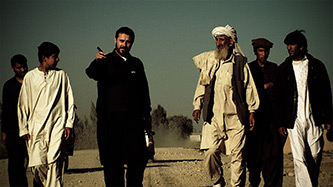Signing on to shoot and direct investigative journalist Jeremy Scahill’s documentary about his investigation into covert American military operations must have required courage. Scahill takes you and your camera beyond the relative safety of being embedded with US troops: to remote Afghan villages, to Yemen, and into the encampments of Somali warlords. The story that is uncovered in those places – that of J-SOC, a shadowy military unit operating with little oversight, answerable only to the highest levels of the US government – must have also had you feeling a bit unsafe at home as well.
Scahill traces J-SOC’s involvement in raids that left Afghan civilians dead and drone attacks in Yemen. Sadly, such revelations are no longer shocking. But they’re still damning. You and Scahill do a good job of making the story engaging – even thrilling, at times.
You take us into the action. We’re right there in the backseat of the car when Scahill and his various guides drive through dangerous territory to meet with the people who have been affected by these secret military operations. It makes the film come alive in the way that talking heads can’t. Your direction created a narrative rather than an accumulation of facts (though it might have been nice if you’d labeled the scenes that were recreations, even though understandably, you didn’t want to break up the momentum you’d built).
Recreations notwithstanding, I did like many of your stylistic choices: the drained and muted colour; the darkened edges of your frame. It makes for a striking contrast when you include footage from White House press conferences and American news shows, which are as bright and artificial as scenes from amusement parks.
I understand that it’s necessary for Scahill to lead the audience through the story. This is a journalistic documentary, after all, and we need him to connect the dots and explain the complications. But the problem is that the film ultimately seems to make Scahill the focus. There are countless shots of him pinning documents to wall, or writing in hip-looking Brooklyn bars, or simply sitting and thinking. In his narration, the word “I” is used a lot. A lot. It’s almost as though you were both afraid that without the fearless, rakish reporter at its center, we weren’t going to connect with the story. I don’t think that would have been the case. The story is important and Scahill has done tremendous work on it. But you both need to get out of the way.







